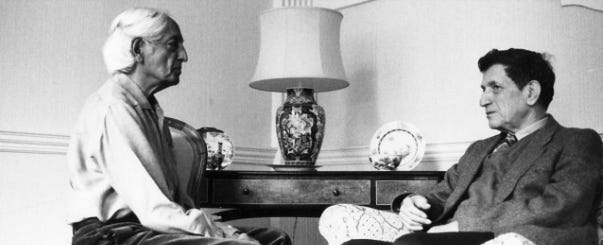A student of both Oppenheimer and Einstein, David Bohm advanced a penetrating critique of scientism and the limitations of ‘thought’. As we'll see, this tied intimately with his philosophy of dialogue. I begin by quoting again from ‘On Dialogue’
“the very notion which has been defining science today is that we are going to get the truth. Few scientists question the assumption that thought is capable of coming to know 'everything'. But that may not be a valid assumption, because thought is abstraction, which inherently implies limitation. The whole is too much. There is no way by which thought can get hold of the whole, because thought only abstracts; it limits and defines. And the past from which thought draws contains only a certain limited amount. The present is not contained in thought; thus, an analysis cannot actually cover the moment of analysis.”
To think with Bohm, is to develop a sensitivity to the limitations of thought. In particular, we could say the limitations of ‘propositional’ knowledge. We cannot know the ‘whole’ by describing it in words, spoken or written, nor can we capture it in numbers. However, perhaps we can ‘know’ the whole in other ways, through participating in it—a participatory knowing.
Bohm saw thought as underlying our deepest challenges. In 'On Dialogue' he describes the great ideological projects of the last two centuries in democracy, socialism, fascism, and communism as attempts to ‘solve’ the problems of society at the wrong level. Such grand ideological projects all emerge out of a kind of civilisational addiction to thought and progress. Bohm reflects that we have come to trust in the progress of thought because it has delivered incredible fruits in science, medicine and technology. Many of these have radically improved the human circumstance but he calls on us to recognise the danger of this elevation of thought. Thought carries a great risk, namely in its implicit propensity to fragment reality:
“[we] take parts, separate them from the whole. Dividing things which are not really separate and forgetting we have done so. This may have begun thousands of years ago but the source of this fragmentation is not back in ancient times, when it may have started-but rather the source is always now. We must turn our attention to thought, not as an abstract but as a living process just as real and significant as those we observe in the material world.”
The kind of fragmentation Bohm is describing is at one level in our knowledge systems, for example, in hyper-specialised fields (academic, corporate, medical, scientific) that lack deep inter-disciplinary and sensory integration. Professional culture says that what's going in an academic's emotional experience or personal relationships has nothing to with their academic work. This is fragmentation. Fragmentation also lives at the level of our perception. In this way, it can be invisible to us because we do not see that we perceive ourselves as separate. Separateness may be the lens through which we've always seen.
Reading the above passage, I was most struck by how Bohm locates the source of fragmentation 'always in the now'. That no matter how we became fragmented, the fragmentation always lives and propagates in each moment. As a metaphysical or spiritual claim this is quite interesting. We can see in the context of personal healing that this can restore agency in the present. Rather than giving primacy to the tyranny of a past-story or the feelings bound up with it we might find a liberation in attending to the source in the present moment. When we can locate and address the fragmentation in the present, we might shift the experience of the present and in so doing, the meaning of the past and future. We of course have to also be careful not to stray into a bypassing of experience. It may be that fragmentation is only resolved through a process of feeling it. We could perhaps also substitute 'fragmentation' with separation. Using Bohm’s framework, we recognise that separation from the whole (or God) always lives in the present. It is only by attending closely to the moment in all its fullness that we can notice and disentangle our fragmentation.
Thought & Global Crisis:
Bohm’s vision of polycrisis was striking and ahead of its time. He foresaw the cacophony of crises and existential risks gathering overhead and underfoot, including nuclear weapons, ecological destruction, and soil erosion. “This state of affairs, which is so destructive and so dangerous and so conducive to unhappiness” in which we seem to be “mesmerised in some way. We go on with this insanity and nobody seems to know what to do.”
In the age of global consciousness and global crises, we are continually contending with the whole. Our existential concerns are globally interconnected; arising from complex interactions of psychology, ecology, economy and many more forces. However, the tools with which we approach these problems are often scientistic; they are characterised by a reliance on quantification, measurement and a grasping through thought. The current breakdown suggests that this approach is not working. Bohm stresses that we cannot think the whole. There is a core insight to glean here. To properly respond to the problems of the whole, we need to properly relate to them. We cannot do this through fragmented knowledge and fragmented ways of thinking. How then? Through dialogue. In dialogue Bohm offers a way to feel the whole, to partake of the whole and to hold its complexity through a shared field of meaning. His choice of the word 'partake' intentionally evokes the partaking of communion, a sacred ritual intended to connect ourselves with a body larger than our own. The practice of dialogue bears the potential of a communion which addresses the source of fragmentation.
Agency and responsibility in the problem of thought:
By realising the spirit of wholeness in Bohm’s philosophy, we find agency. This is because it frees us from the sense that the problems of the world are external to us and fundamentally too big to address. The world's crises are rooted in thought. Rather than seeing this as an external matter, we realise that we are a part of it, and it is a part of us. The crisis, or rather the fragmentation, lives in us—it pervades our internal worlds, and therefore we have some agency in it.
Scapegoating will not suffice. Bohm warns against attempts to identify the source of our problem as being ‘over there’, a result of others thinking wrong thoughts. The problem of thought is fundamentally collective, it pervades “the whole process of thought…which belongs to all of us.” Bohm understood us to be an emergent expression of culture, collective thought, and our ancestors—all of which intimately shape our thoughts, reactions, emotions, and values. As a result, our thoughts and minds are never completely separate from collective thought and collective mind.
Properly integrated, this understanding of interbeing can be a deeply empowering idea. In a recent dialogue with Matthew Green and Liam Kavanagh on climate change we explored the climate crisis through this very lens discovering a real sense of agency. When we can understand ourselves as microcosms of the macrocosm in an 'as above, so below' fashion, we find deep salience and relevance in our immediate web of life. In my course, Men Emerging I explored my idea of 'leadership from the centre'. The centre holds three key embedded senses, first leading from the heart-center, second leading from the heart-center of the dialogue and third leading from the heart-centre of our lives. We are the centre of our own web of life. The frontline of the world is always your own life. Our thoughts, feelings, our relationships are deeply entangled with the web of life and always have implications extending beyond ourselves.
The problem of thought and its fragmentation is never fundamentally ‘over there’, it is always here. Our agency is always found here.
Dialogue and consciousness transformation
Dialogue is absolutely essential to addressing complex issues and surpassing the myriad challenges of today. However, problem solving was never the end point for Bohm, it was merely one of the fruits of the practice of dialogue. Bohm envisions something more: “that there is the possibility for a transformation in the nature of consciousness, both individually and collectively, and whether this can be solved culturally and socially depends on dialogue.”
Since the 1960s the notion of ‘awakening’ has gained renewed currency in the post-christian West. Today we’re seeing a whole new cultural movement toward’s ‘awakening’ and consciousness transformation in various forms. Bohm’s message to this movement is simple, we cannot go it alone. Individual awakening or a consciousness shift is insufficient for humanity to pass the baton through this treacherous period of transformation.
One gets the sense listening to Bohm that he knew he had barely scratched the surface of what was possible in dialogue. Decades on, as a student and practitioner of dialogue I feel the same. We have just begun our journey into the horizon of dialogue.
Bohm speculates on this greater possibility for dialogue:
“When we have this very high energy of coherence, it might bring us beyond just being a group that could solve social problems. Possibly it could make a new change in the individual and a change in relation to the cosmic.”
This change in relation to the cosmic through the local was what Bohm referred to as communion “the idea of partaking of the whole and taking part in it; not merely the whole group, but the whole.”
—
Learning from Bohm’s Dialogues with Krishnamurti
Over the last year, I listened to probably 20-30 hours of archived dialogues between Bohm and his chief interlocutor the philosopher J.Krishnamurti which were recorded at Ojai California and Brockwood park in the 70s and early 80s. These two men had very different personalities and the dialogues reveal something of Bohm that we cannot get from his writing: his style in the dance of dialogue. Bohm was quiet, attentive, and curious. Krishnamurti in contrast was a bombastic, energetic mystic who frequently took the conversation beyond what we understand to be possible—sometimes in a provocative manner. Bohm was never thrown off, nor did he shut down the field of potential. He carefully entertained Krishnamurti’s wild movements into the unknown without dismissing them.
Bohm's way of relating to Krishnamurti taught me in a deeper sense to ask questions when I don’t understand. His recorded dialogues profoundly embody the suspension of judgement and continually holding open of a space of enquiry. When we engage deeply with a philosopher like Bohm we gradually ‘internalise the sage’. Having launched a pioneering and experimental Dialogos practice, I felt drawn to find some esoteric gems in these dialogues. To my surprise what I gleaned was some practical relationship skill. In my romantic partnership I was finding moments in conversation where we’d strayed into a terrain beyond my understanding and comfort zone. Some part of me had been unconsciously tuning out. Then, one day, after many many hours with Bohm I was able to unexpectedly make a novel movement. I suspended judgement, instead of contracting I asked questions and began to investigate the matter. It was a simple shift but a profoundly impactful one which opened doors in my nearest and dearest dialogue.
I'm deeply thankful for Bohm's work, and for all the sages who have have breathed life into my fire. There is much more for us to explore in the art and science of dialogue and I hope you’ll join me for the journey.
—







Very interesting, and along similar lines to Dr Iain McGilchrist's more recent ideas. I had not realized before that the globalists, who are trying to grasp the whole [world] are doom to fail because they are using fragmentary thinking.